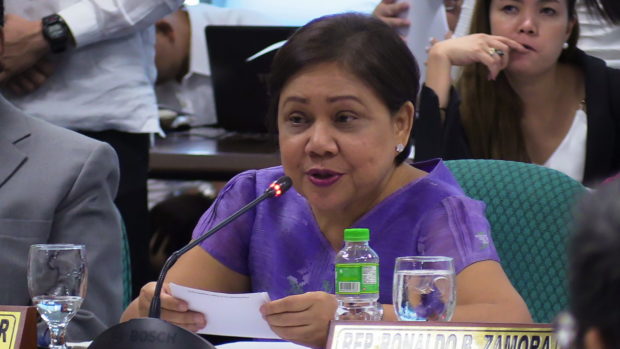Villar seeks scrutiny of agencies on implementation of rice tariff law

Sen. Cynthia Villar. INQUIRER.net file photo / CATHY MIRANDA
MANILA, Philippines — Senator Cynthia Villar is seeking to put under Senate scrutiny the concerned government agencies on the proper implementation of the rice tariffication law, which lifts restrictions on rice importation and creates the P10-billion Rice Competitiveness Enhancement Fund (RCEF).
Villar, who chairs the Senate committee on agriculture and food, recently filed Senate Resolution No. 39, calling for a Senate investigation into the implementation of the law and monitor government agencies if they are properly implementing the law and funds are being allocated properly.
“I have to exercise my oversight function to make sure they (agencies) follow the law,” Villar said in an interview at the Senate on Tuesday.
READ: Villar says new rice tariff law is ok; problem is its implementation
“This is very important, this is the competitiveness of farmers kasi we have liberalized the importation of rice so we have to make our farmers as competitive as soon as possible,” she added.
Article continues after this advertisementThe Senate investigation will also seek clarification on the reported release by the Department of Budget (DBM) of P5 billion in December 2018, but only P1 billion of which has been credited to the farmers’ accounts.
Article continues after this advertisement“Mag iinvestigate ako para malaman kung nasaan dinala ‘yung P5 billion,” the senator said.
Under the rice tariffication law or Republic Act No. 1103, instead of limiting the amount of rice that will enter the country, rice imports will instead be charged with tariffs.
Farmers will be given P10 billion a year for the next six years under the RCEF, which will be obtained from the collected tariffs, for the strengthening of their productive capacities.
The law also allocated P5 billion annually to procure rice farm equipment through the Philippine Center for Postharvest Development and Mechanization (PhilMech). Equipment will be given as a grant-in-kind to eligible rice farmer associations and registered rice cooperatives.
Villar said the 947 rice-producing municipalities in 55 provinces were identified to receive farm equipment over the next six years.
The law also provides P3 billion to the Philippine Rice Research Institute (PhilRice) to develop, propagate, and promote inbred seeds.
Meanwhile, P1 billion will be given to Land Bank of the Philippines (LBP) and the Development Bank of the Philippines (DBP) for the creation of a credit facility with minimal interest and collateral requirements.
One billion pesos will also be provided for the skills training in rice crop production, modern rice farming techniques, seed production, farm mechanization, farm machinery servicing and maintenance and knowledge and technology transfer to farming schools nationwide. /jpv
RELATED STORY: